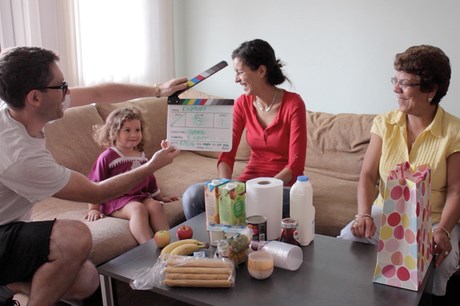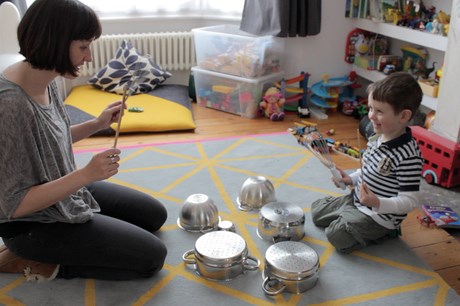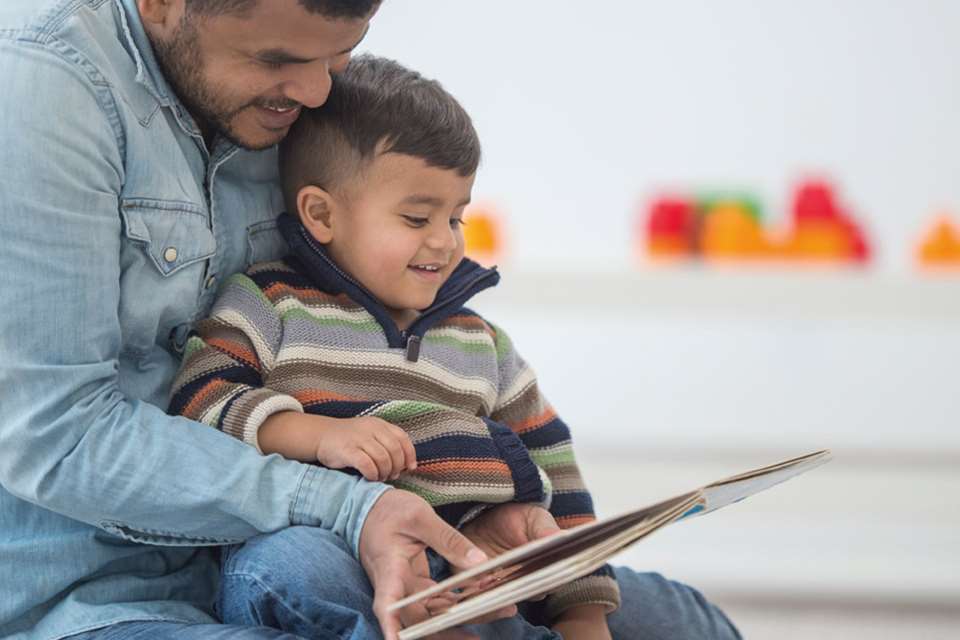Positive Relationships: Parenting Programmes - Easy does it!
Annette Rawstrone
Monday, September 5, 2016
In the first of an occasional series on supporting parents in their children's learning and development, Annette Rawstrone reports on the roll-out of smartphone app EasyPeasy

What shall we play today? Parents are having fun game ideas sent to their smartphones as part of an innovative digital outreach service linking early years settings with families, particularly those who are hard to reach.
The simple games – ranging from treasure hunts to imaginary safaris and band practice – encourage parents to interact with their young children and help to develop the skills that will prepare them for school. The EasyPeasy app has been devised to use technology in a creative and cost-effective way to reach more parents of two- to five-year-olds, with plans to extend to birth to two later this year.
Information and advice on child development accompanies the games and a desktop app allows practitioners in early years settings to share and communicate with parents. Practitioners can use the app to capture information on parental engagement and school readiness.
 EasyPeasy director Jen Lexmond saw first-hand the difficulties of social mobility and improving opportunities for disadvantaged children when working in public policy. ‘All the research kept pointing to the early years. This had a profound effect on me – how quickly the brain develops in the early years and how wide the gap already is when children start school without good foundations, which continues to disadvantage them through their school years,’ she says.
EasyPeasy director Jen Lexmond saw first-hand the difficulties of social mobility and improving opportunities for disadvantaged children when working in public policy. ‘All the research kept pointing to the early years. This had a profound effect on me – how quickly the brain develops in the early years and how wide the gap already is when children start school without good foundations, which continues to disadvantage them through their school years,’ she says.
‘I set about creating something that is non-stigmatising and focused on play – not parenting advice or a course but simple things to do that don't need much preparation or props and are supportive of children's development. Many parents during the research reported difficulties leaving the house. We're using technology to reach families where they are and connect them with brilliant local support services such as children's centres and schools.’
RULES AND ROUTINES
A 2015 feasibility study of EasyPeasy in a south London primary school showed that using the app increased play and warmth in parent-child interactions and helped parents with sticking to rules and routines at home. Supported by the Parental Engagement Fund (see box), EasyPeasy has been trialling an 18-week model of the intervention in partnership with Bournemouth Council across its eight children's centres, plus a parallel 10-week trial across 16 schools and children's centres in the London Borough of Newham.
Parents receive a game each week to play with their child. They are grouped into ‘Pods’, providing a virtual support network where they can discuss the games, and the challenges and successes of using them to engage their children. Each Pod is overseen by a Pod Administrator, a children's centre practitioner who monitors parents’ progress and offers remote support.
Participating schools and children's centres receive a data email each week to show who has engaged with the app, the games they’ve played and any comments. Importantly, it also highlights who hasn't engaged so that practitioners can focus on them.
‘The appeal is that it's very simple. We’ve spoken to parents who are time-poor, tired and say it's easy to run out of ideas to keep children occupied. We initially thought about email, but in one test group no parent could remember their email address but they all had smartphones and used them a lot,’ Ms Lexmond explains.
‘There is a high level of engagement on the app and parents come back again and again. Short films – just one to three minutes long – are used to introduce the games, which is more engaging than text.’
The films show real families playing the games and even making mistakes. Parents are also given bitesize pieces of information on what skills their child is developing through the games – such as working in a team, listening, concentration and self-esteem. The current focus is on social and emotional development but there are plans to increase the amount of games and expand into language and numeracy.
PUPIL PREMIUM
Despite being in its pilot phase, EasyPeasy has already engaged a number of settings nationally. It operates on a licence system depending on the number of families they want to reach, starting from £15 per child per annum. Some schools are focusing on Pupil Premium families to try to narrow the gap in attainment, while others are signing up families at the start of the summer to ease the transition to Reception.
‘Over a short time parents play more with their child and are reporting more quality interactions. They get better at sticking to rules and routines at home, which is exciting because improving habits is an important quality to support children's early development,’ says Ms Lexmond.
- In its first randomised control trial, with a sample of 60 parents trying EasyPeasy games for a period of just one week, compared to a control group, parents reported:
- spending more time playing with their children (+10 per cent)
- sticking to rules and routines more consistently (+8 per cent)
- having more positive interactions with their child (+4 per cent).
‘There's lots of support on offer in the early years for health and physical development but not to support parents to understand intellectual, social and emotional development,’ Ms Lexmond says. ‘My vision for EasyPeasy is for it to be like Bounty Bags, shared with every family and there from the very beginning to starting school.’
STORIES FOR YOU AND YOURS
Reading for pleasure is the single most important thing that will make a child successful in life (UNESCO) and is better for a child's cognitive development than their parents’ level of education (Institute of Education, 2013). But for parents who have never been readers it can be difficult to know where to begin, so The Reader has devised a confidence-boosting course to enable them to embark on a reading journey with their children. It aims to:
equip parents who may have had ad hoc schooling to enjoy reading with their child in a non-pressured environment
promote enjoyment above ‘literacy’ – the big first step is getting children to want to read
boost a child's socialisation skills, language development and imagination
encourage parents to get involved with their child's school during transition to Reception
promote positive emotional attachment between child and parent.
As part of the Parental Engagement Fund, The Reader is working with Sefton Council, Merseyside, to deliver intervention across 31 nurseries and schools. Parents and children, aged three to four, are attending five hour-long Magical Storytime sessions led by a shared reading specialist where they read stories aloud and do related craft activities. They aim to engage children and parents in the joy of sharing stories, rhymes and songs.
This is followed by three weeks of Stories for You and Yours, exclusively for parents. Each two-hour workshop aims to promote parents’ confidence in selecting appropriate books and reading aloud to their child and using stories to develop speech and imagination. ‘The emphasis is always on pleasure for parent and child,’ says project co-ordinator Alex Joynes. ‘The sessions also give parents the chance to enjoy an adult story read to the group with pauses to share their thoughts. Parents have reported that this has made them realise the value of their own opinions and the importance of slowing down stories and talking about their ideas on the story. Parents have said that after the first session, which focuses on tips for sharing stories with children, they have begun to ask more questions about the stories they read, as well as discussing the pictures and using techniques to develop imagination and enjoyment of books.’
Early feedback has been positive from both schools and parents. One parent said how she had bought new books for her child. Another wrote on her feedback form: ‘The workshops have been brilliant for myself and my daughter. Seeing how much she enjoys them really encourages me to take time out and sit to read with her.’
PARENTAL ENGAGEMENT FUND
Children from the poorest backgrounds are 19 months behind their most affluent peers at the start of school. Existing research shows that involving parents in their children's learning is associated with improved attainment and educational participation, but less is known about which methods of engagement are the most effective or why, so the Sutton Trust is working in partnership with the Esmée Fairbairn Foundation on a major piece of work on parental engagement in the early years and primary school phases.
The Fund is supporting the growth, increased effectiveness and measurement of impact of a selection of parental engagement projects aimed at improving children's cognitive development. The six projects involved are being funded until late 2017. They are paired with an expert team from the University of Oxford to provide support to help them develop evidence of impact and identify the active ingredients in successful parental engagement interventions.
MORE INFORMATION
EasyPeasy is offering a £9 per child rate for Nursery World readers during September. Email: hello@easypeasyapp.com








